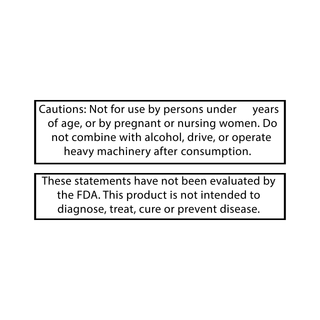Delta-9 THC (tetrahydrocannabinol) is the main psychoactive component of cannabis responsible for the effects of euphoria and altered perception of reality. It interacts with our body's endocannabinoid system by activating specific receptors in the brain. As the use of Delta-9 is growing for both medical and recreational purposes, it is important to understand its effects on physical and mental health. Scientific research is helping to identify both the positive and potentially dangerous effects of this substance, which is important for responsible use.
Mechanism of action of Delta-9 on the body
Delta-9 THC affects the body through interaction with the endocannabinoid system, regulating various physiological processes. Its action occurs through the activation of specific receptors that affect the functioning of the brain and central nervous system. A common question is how long does Delta-9 effects last?
Interaction with the endocannabinoid system
The endocannabinoid system plays a key role in regulating many bodily functions, such as appetite, pain, mood, and memory. Delta-9 THC acts as a cannabinoid that activates receptors in this system. These receptors are present throughout the body, but their highest concentration is in the brain and central nervous system. The main receptors affected by Delta-9 are CB1 and CB2.
How Delta-9 activates cannabinoid receptors (CB1 and CB2)
The CB1 receptor is found primarily in the brain and nervous system, and CB2 is found in cells of the immune system. Delta-9 THC interacts with CB1 receptors, which leads to changes in signal transduction between neurons. This causes psychoactive effects, such as euphoria, changes in perception of time and space, and mood changes. CB2 receptors, which can also be affected by Delta-9, are involved in the regulation of inflammation and pain, which explains its medical use for the relief of chronic pain and inflammation.
Effects on the central nervous system
By activating CB1 receptors in the brain, Delta-9 THC alters the functions of the central nervous system. This can affect cognitive ability, memory, attention, and emotions. In the short term, it can lead to euphoria and reduced anxiety, but high doses can cause anxiety, paranoia, or cognitive impairment. Long-term use of Delta-9 can affect memory and learning ability, especially in young users whose brains are still developing.

Effects of Delta-9 on the brain. Does delta 9 get you high?
Delta-9 THC has a significant effect on brain function, altering cognitive processes, mood, and mental state. Its interaction with cannabinoid receptors can lead to both positive and negative effects for users.
How Delta-9 affects cognitive function and memory
Delta-9 activates CB1 receptors in the brain, particularly in the hippocampus, which is responsible for memory and learning. Under the influence of THC, short-term memory can deteriorate, making it difficult to concentrate and process information. In the short term, users often have difficulty remembering new facts. Chronic use of Delta-9 can lead to long-term cognitive impairment, especially in young people whose brains are still developing.
Changes in mood and mental state (euphoria, anxiety, paranoia)
Delta-9 causes feelings of euphoria and relaxation through stimulation of the brain's reward system, including dopamine pathways. However, in high doses, THC can cause negative reactions such as anxiety and paranoia. These conditions occur due to overstimulation of CB1 receptors, which disrupts the balance of neurochemical processes, causing panic attacks in some users.

Risk of long-term mental changes with chronic use
Regular use of Delta-9 is associated with an increased risk of developing mental disorders such as depression and anxiety. In people prone to mental illness, chronic THC use can worsen symptoms or cause psychotic episodes. It is especially dangerous to use Delta-9 during adolescence, when the brain is still developing. Studies show that adolescents who regularly use cannabis may experience cognitive decline in adulthood.
Delta-9 has significant effects on the brain, affecting both short-term and long-term mental functioning and health. Additionally, many users wonder, can you fly with Delta-9? It's important to note that traveling with Delta-9, especially across state or country borders, can lead to legal issues, depending on local laws.
Physical effects of Delta-9
Delta-9 THC affects not only the mental state, but also physiological processes, including the cardiovascular, respiratory, and metabolic systems. Understanding these effects is important for safe use.
Effects on the cardiovascular system
Delta-9 activates CB1 receptors, which are responsible for regulating heart rate and vascular tone. One of the most common effects after consumption is an increase in heart rate. This effect can last for several hours and is accompanied by a slight increase in blood pressure. For healthy people, this usually does not pose a threat, but for those with heart disease or high blood pressure, Delta-9 can be dangerous, as it increases the risk of arrhythmias or other complications.
Effects on the respiratory system (when smoked)
Smoking Delta-9 through flowers or vapes can negatively affect the respiratory system. Prolonged smoking of smoke containing toxic substances leads to lung irritation, chronic coughing, and increases the risk of developing bronchitis or other respiratory diseases. Although vaping is considered to be less harmful, it can also cause respiratory problems, especially when using cartridges of questionable quality. People with asthma or other lung conditions should avoid smoking Delta-9 due to the increased risk of complications.
Changes in appetite and metabolism
One of the characteristic effects of Delta-9 is an increase in appetite. Cannabinoids stimulate receptors in the hypothalamus that control appetite, which often leads to intense hunger. This phenomenon can be beneficial for people who suffer from loss of appetite due to illness or treatment, such as after chemotherapy.
Delta-9 also affects metabolism. While this effect can be positive for people with low weight, in many cases, appetite stimulation can lead to overeating and, as a result, weight gain with regular use.

Delta-9 has a significant impact on physiological processes that can be both beneficial and harmful, depending on the method of consumption, health status, and frequency of use.
Delta-9 and addiction
Regular use of Delta-9 THC can lead to tolerance, which increases the risk of addiction. The body gradually gets used to Delta-9, and higher doses are needed to achieve the same effect, which increases the likelihood of both psychological and physical dependence.
Development of tolerance and dependence
Over time, Delta-9 THC stimulates the CB1 cannabinoid receptors in the brain, but these receptors become less sensitive to the effects of the substance. This leads to users often increasing their dosage. Psychological dependence manifests itself as a constant desire for euphoria or relaxation, and physical dependence occurs when the body needs Delta-9 to function properly. Although physical dependence is less pronounced, the symptoms of withdrawal can be quite unpleasant.
Withdrawal symptoms when stopping use
The following symptoms may occur when you abruptly stop using Delta-9:
- Irritability
- Insomnia
- Anxiety
- Loss of appetite
Although these symptoms are not life-threatening, they can be a reason to return to use. Delta-9 addiction emphasizes the importance of responsible use to avoid negative consequences.
Medical potential of Delta-9
Delta-9 THC has significant medical potential, thanks to its properties that help combat a number of diseases and conditions. It is used to reduce pain, nausea, stimulate appetite, and reduce stress. However, as with any medication, Delta-9 requires careful use and consultation with your doctor.

Medical uses of Delta-9
Delta-9 THC is effective in several key areas of treatment:
- Analgesic: Delta-9 is widely used to relieve chronic pain, particularly in conditions such as cancer, multiple sclerosis, arthritis, and other conditions that come with constant pain. Its ability to block pain signals makes it an effective alternative to opioids.
- Antiemetic agent: Delta-9 helps reduce nausea and vomiting, particularly in patients undergoing chemotherapy or other aggressive treatments. This property improves the quality of life of patients, helping them to tolerate therapy more easily.
- Stimulation of appetite: Patients with anorexia, AIDS, or those who lose their appetite due to other medical conditions can benefit from the appetite-stimulating properties of Delta-9. Its effect on the receptors in the brain responsible for appetite helps patients maintain a healthy weight.
- An anxiolytic agent: In low doses, Delta-9 can reduce stress and anxiety levels, making it useful for people with post-traumatic stress disorder (PTSD) or other anxiety conditions.
Delta-9 has the potential to be used in a variety of medical fields, but its use requires strict dosage control and constant monitoring by doctors due to possible side effects.










